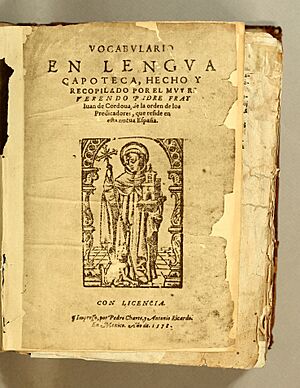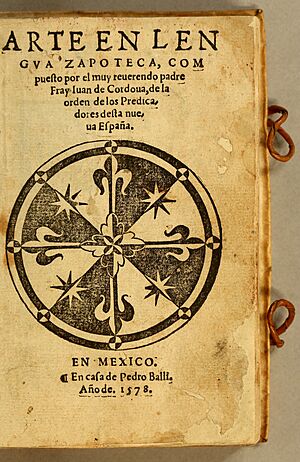Juan de Córdova facts for kids
Juan de Córdova was a Spanish friar who lived a long and interesting life. He was born in 1503 in Cordova, Spain, and later became a Dominican friar. He is famous for his important studies of the Zapotec languages spoken by native people in Mexico. He passed away in 1595 in Oaxaca, Mexico. It's not fully known if Córdova was his family name or if he took it from his hometown after joining the Dominicans.
Juan de Córdova's Life Story
Juan de Córdova started his career as a soldier. He served in a place called Flanders before traveling to Mexico. In 1540, he joined an important expedition with Coronado to explore New Mexico.
After his time as a soldier, Juan de Córdova decided to join the Dominican Order in Mexico in 1543. He was sent to Oaxaca in 1548. There, he learned the Zapotec language and worked with the local Indigenous people. He became a leader, known as a provincial, in 1568.
Juan de Córdova was a very strict leader, perhaps because of his military background. Some people found his leadership style difficult. In 1570, he decided to step down from his leadership role. He chose to retire to a convent in Tlacochauaya, Oaxaca. For the next twenty-five years, he dedicated his life to studying the Zapotec language and learning about the customs of the native people. He died there, having spent many years focused on his passion for language and culture.
Juan de Córdova's Important Books
Juan de Córdova wrote two very important books about the Zapotec language. These books helped people understand and learn the language.
One of his main works was a dictionary called "Vocabulario de la Lengua Zapoteca, ó Diccionario Hispano-Zapoteco." This book was published in Mexico in 1571 or 1578. It helped Spanish speakers learn Zapotec words and vice versa.
His other significant book was "Arte en Lengua Zapoteca," which came out in 1578. This book was not just about grammar. It also included valuable information about the traditions and beliefs of the Zapotec people. It even explained how they kept track of time. This part of his book was later republished by Manuel Orozco y Berra, showing how important it was for understanding Zapotec culture.
See also
 In Spanish: Juan de Córdova para niños
In Spanish: Juan de Córdova para niños
 | Jackie Robinson |
 | Jack Johnson |
 | Althea Gibson |
 | Arthur Ashe |
 | Muhammad Ali |



